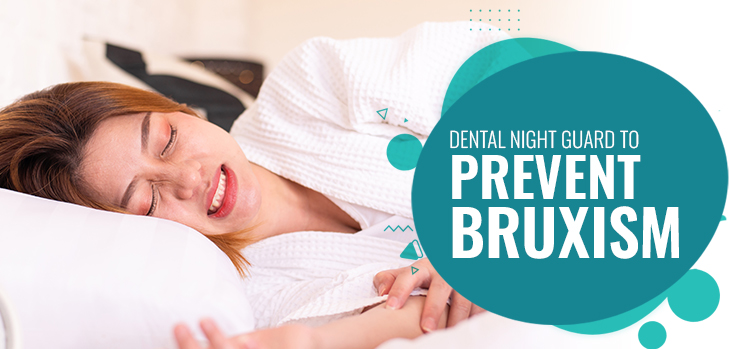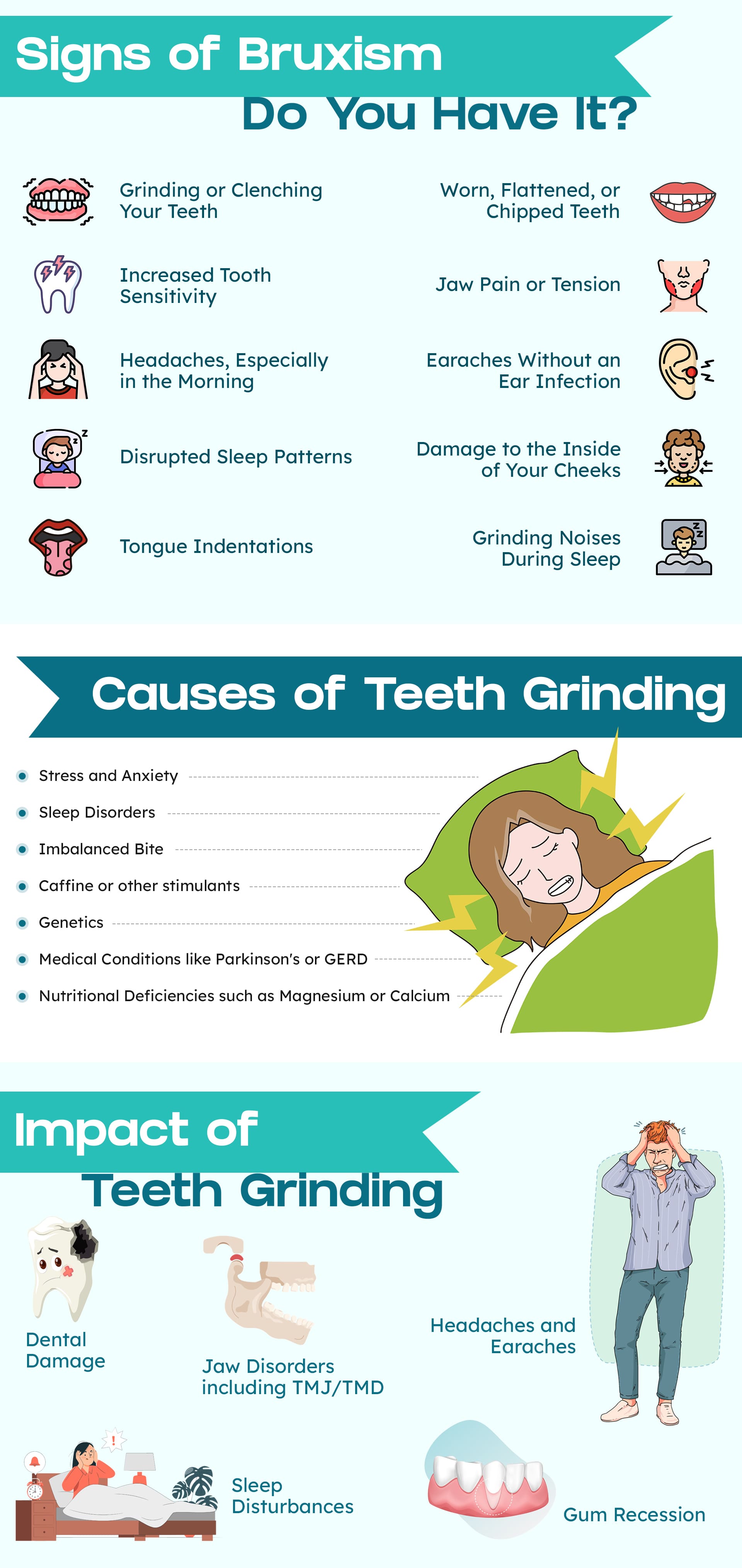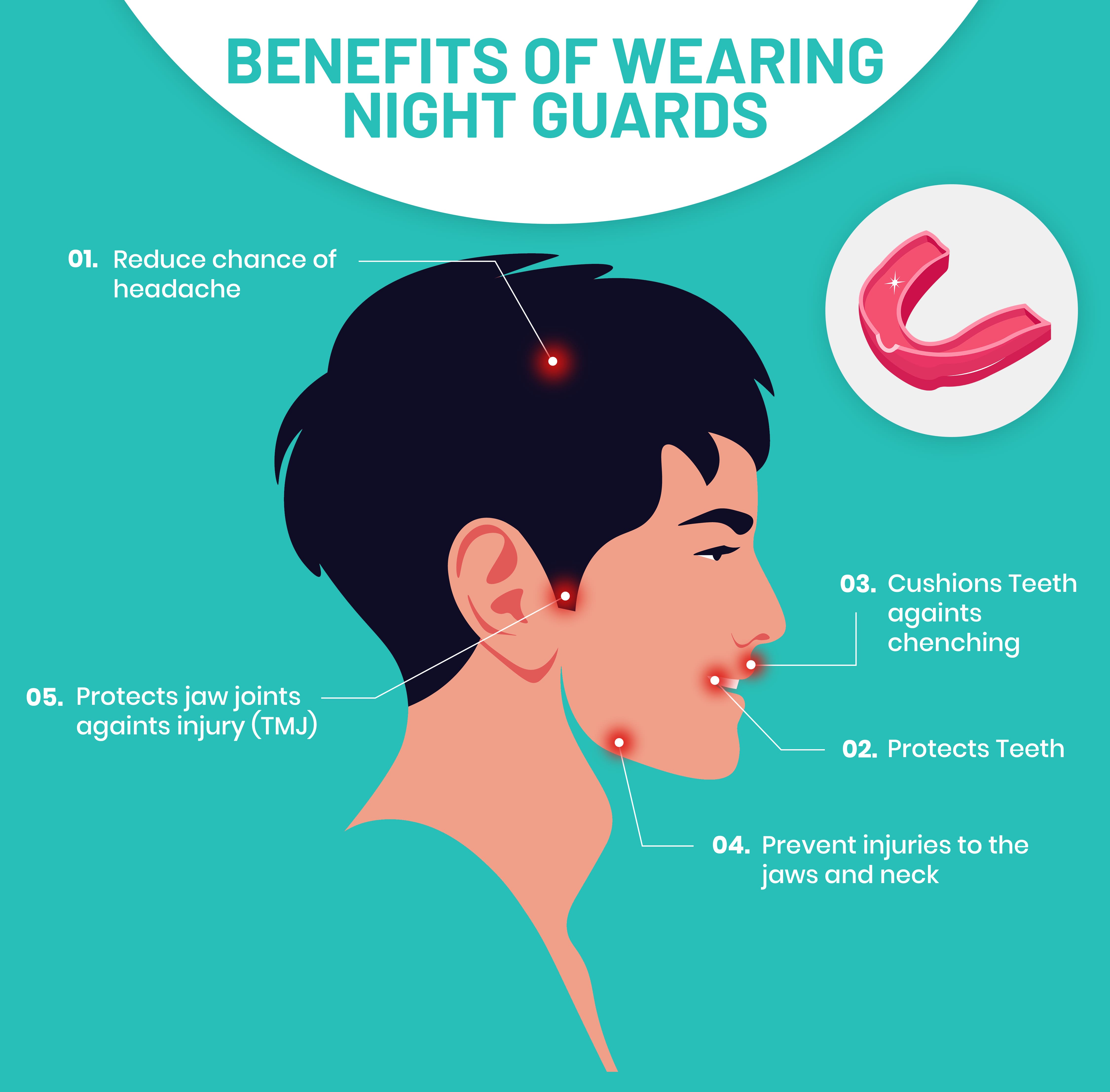


Mar 13,2024 | Read Time: 9 min
Dental night guards are an essential tool in preventing bruxism, a condition which occurs due to teeth clenching and grinding during sleep. Bruxism can have detrimental effects on dental health, leading to, jaw pain, tooth damage headaches, and other related concerns. In this comprehensive article, we will delve into the world of dental night guards, exploring their role in gum shield for bruxism prevention and how they can protect teeth from the harmful effects of grinding and clenching.
Bruxism is a common condition that can cause tooth damage, headaches, and jaw pain. A dental night guard can help prevent bruxism by cushioning the teeth and reducing grinding. There are different types of dental night guards, including custom-fit and over-the-counter options. To choose the best dental night guard, consider your budget, comfort level, and specific needs. Proper care and maintenance of your dental night guard can help it last longer and prevent bacterial growth.
According to BBC News, some dentists report an increase in teeth grinding due to rising stress levels and concerns about the recession.
Read the story : http://news.bbc.co.uk/2/hi/8545243.stm
Bruxism is a common condition affecting children as well as adults. It involves the involuntary grinding, clenching, or gnashing of teeth, usually during sleep. Though teeth grinding might not be the reason for much harm, chronic bruxism can be the reason for several dental concerns. The excessive force exerted on the teeth can result in tooth wear, fractures, and even tooth loss. Additionally, bruxism can cause jaw pain, headaches, earaches, and temporomandibular joint (TMJ) disorders. It is crucial to address bruxism promptly to prevent further damage to dental health.
According to independent.co.uk, Bruxism is one of the contributing factor for sleeping disorders.
Read the full article: https://www.independent.co.uk/life-style/health-and-families/features/sleep-disorders-when-going-to-bed-is-a-nightmare-1840864.html
A dental night guard is a custom-made oral appliance that acts as a protective barrier between the upper and lower teeth. It absorbs the force generated from clenching and grinding, thus avoiding direct contact between your teeth and lessening the risk of further damage. By creating a cushioning effect, the night guard distributes the pressure evenly across the teeth and jaw muscles, alleviating strain on the temporomandibular joint. This not only protects the teeth but also helps to alleviate associated symptoms such as jaw pain and headaches.

Dental night guard generally works with a barrier between your lower and upper teeth. This can avoid them from clenching or grinding against each other.
A dental night guard is a device that is worn over the teeth while sleeping to protect them from grinding or clenching.
The benefits of using a dental night guard include reducing tooth wear, preventing tooth damage, reducing jaw pain and headaches, and improving sleep quality.
A dental night guard is made by taking an impression of the teeth and sending it to a dental lab, where the guard is custom-made to fit the individual's teeth.
A dental night guard works by creating a physical barrier between the upper and lower teeth. It is typically made from a durable, yet flexible material that can withstand the forces exerted during grinding and clenching. When worn, the night guard absorbs the impact of these forces, preventing direct contact between the teeth. Instead of wearing down the natural tooth structure, the night guard takes the brunt of the pressure, preserving the integrity of the teeth. Additionally, the night guard helps to position the jaw in a more relaxed and comfortable position, reducing strain on the jaw muscles and joints.
There are several types of dental night guards available, each with its own advantages and disadvantages. The most common types include stock night guards, boil-and-bite night guards, and custom-made night guards. Stock night guards are pre-formed and ready to use but may not provide an ideal fit. Boil-and-bite night guards can be customized by softening them in hot water and then biting into them to create a mold. While they offer a better fit than stock guards, they may not be as precise as custom-made options. Custom-made night guards are created by dental professionals based on impressions of the patient's teeth. They offer the best fit and comfort but tend to be more expensive.
Choosing the right dental night guard depends on individual needs and preferences. Factors to consider include comfort, durability, ease of cleaning, and cost. For those with mild bruxism or occasional teeth grinding guard, a stock or boil-and-bite night guard may suffice. However, individuals with severe bruxism or those who require a more precise fit should opt for a custom-made night guard. It is essential to consult with a dentist or dental professional who can assess your specific needs and recommend the most suitable option.
To get fitted for a dental night guard, visiting a dentist at Smile Works Dental is necessary. The process typically involves taking impressions of the teeth using dental putty or digital scanning technology. These impressions are then used to create a custom night guard that fits snugly over the teeth. The dentist will ensure that the night guard aligns properly with the bite and provides optimal protection. It is important to follow the dentist's instructions for wearing and caring for the night guard to ensure its effectiveness.
Proper care and maintenance of a dental night guard are crucial for its longevity and effectiveness. After each use, rinse the night guard with cool water to remove any debris or saliva. Brush it gently by using soft bristled toothbrush and non-abrasive toothpaste or mild soap. Avoid using hot water, as it can distort the shape of the night guard. Additionally, store the night guard in a clean, dry container when not in use to avoid contamination. Try to inspect your night guard for any signs of wear or damage and consult your dentist if any issues arise.
The lifespan of a dental night guard varies based on factors such as materials you use, severity of bruxism, and how well you take care of it. On average, a well-maintained, custom-made night guard can last between 2 to 5 years. However, it is important to monitor the condition of the night guard regularly and replace it if signs of wear or damage are present. Consult with your dentist if you experience any changes in your bruxism symptoms or if you notice any issues with your night guard.
While dental night guards are primarily used for bruxism prevention, they can also provide relief for other dental issues. For individuals with temporomandibular joint (TMJ) disorders, wearing a night guard can help alleviate jaw pain and reduce muscle tension. Night guards can also be beneficial for those with tooth sensitivity, as they provide a protective barrier against external stimuli. However, it is important to consult with a dentist or dental professional to determine if a night guard is suitable for your specific dental concerns.

Wearing a dental night guard comfortably requires some adjustment, especially for first-time users. Initially, it may feel bulky or awkward in the mouth, but with time, most individuals adapt to wearing it. To enhance comfort, ensure that the night guard fits properly and does not exert excessive pressure on any particular area. Follow the dentist's instructions for wearing the night guard, including the recommended duration of use. It is also helpful to relax the jaw muscles before inserting the night guard and to practice good sleep hygiene to promote better sleep quality.
Adjusting to wearing a dental night guard can take time and patience. Start by wearing the night guard for short periods during the day to get accustomed to the sensation. Gradually increase the duration of wear until you can comfortably wear it throughout the night. If you experience any discomfort or soreness, consult your dentist, as adjustments may be needed. It is important to persevere through the adjustment period, as the long-term benefits of wearing a night guard far outweigh any initial discomfort.
Proper cleaning of a dental night guard is essential for maintaining hygiene and preventing damage. After each use, rinse night guard by using cool water to get rid of saliva or debris. Use a soft toothbrush and mild soap or non-abrasive toothpaste to gently brush the night guard. Do not take hot water or use harsh chemicals as these may cause damage to the material. Additionally, consider using a denture cleaner or a specialized night guard cleaning solution to keep the night guard fresh and free from bacteria. Regular cleaning will help prolong the life of the night guard and ensure its effectiveness.
Storing a dental night guard safely is crucial to prevent damage and contamination. After cleaning, ensure that the night guard is completely dry before storing it. Place it in a clean, dry container with adequate ventilation to prevent the growth of bacteria or mold. Avoid storing the night guard in direct sunlight or extreme temperatures, as this can distort the shape of the material. It is also important to keep the night guard away from pets or young children who may mistake it for a toy. By following these storage guidelines, you can maintain the integrity of your dental night guard and ensure its longevity.
In conclusion, dental night guards play a vital role in preventing bruxism and protecting dental health. Bruxism can have detrimental effects on teeth and overall oral well-being, making it crucial to address the condition promptly. Dental night guards provide a cushioning effect that absorbs the force generated by grinding and clenching, protecting teeth from wear and damage. By wearing a properly fitted night guard, individuals can alleviate symptoms such as jaw pain and headaches, promoting better sleep quality and overall oral health.
When choosing a dental night guard, it is important to consider individual needs and preferences. Consulting with a dentist or dental professional can help determine the most suitable option based on the severity of bruxism and the desired comfort level. Proper care and maintenance of the night guard are essential for its longevity and effectiveness. Regular cleaning, storage in a clean container, and regular monitoring for signs of wear or damage are key to ensuring optimal performance.
Overall, dental night guards are an invaluable tool in bruxism prevention and dental health protection. By investing in a high-quality night guard and following proper usage guidelines, individuals can safeguard their teeth, alleviate associated symptoms, and promote better oral well-being.